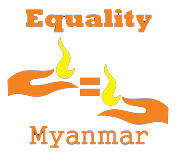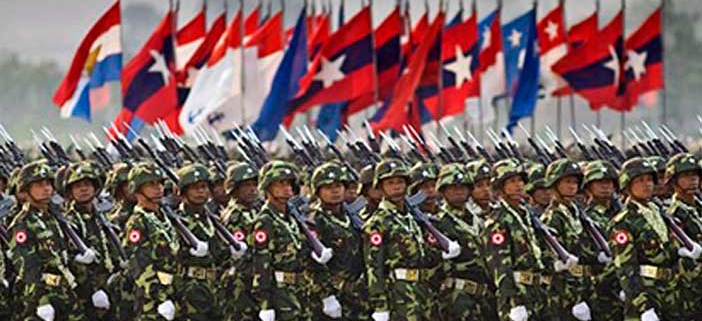WEDNESDAY, 15 FEBRUARY 2012
Opposition MPs in Burma have called for a dramatic curtailing of the influence of the armed forces in civilian affairs, describing the military’s continuing role in a variety of sectors as an impediment to progress in the transition to democracy.
The issue of the military’s predominance over the economy, civil service and other key areas has been raised repeatedly over the past two days during parliamentary debates about national planning of state projects, according to the MPs.
Dr. Aye Maung, a respected politician representing Burma’s Arakanese ethnic minority, said he argued in Parliament that the Tatmadaw, or armed forces, should stop existing as a state within a state and undergo major reforms to repair its long-damaged relationship with the civilian population.
Specifically, he said that the Tatmadaw should drastically cut its wide-ranging influence over non-military matters by ending the practice of appointing retired military officials to head civilian departments—something that has been the norm since the army seized power in a bloody coup in 1988.
“I told Parliament that if the Tatmadaw continues to insist that its own members are the most qualified people in every sector of public life, it will only impede efforts to promote civilian professionals and create friction between the army personnel and civilian state employees,” he said.
“The Tatmadaw should recognize the contributions of civilian graduates of medical and engineering schools, instead of always promoting its own army-trained doctors and engineers. This will improve relations between the army and the public,” he added.
Aye Maung said that a number of military representatives in Parliament raised their eyebrows at his suggestions, as did some former military officials elected as members of the ruling Union Solidarity and Development Party (USDP).
Thein Nyunt, another opposition MP, urged Parliament to scrap the slogan, “The Tatmadaw is both mother and father of the state,” which has been ubiquitous across Burma for decades. In its place, he said, should be a new slogan: “The people are both mother and father of the state.”
Two colonels serving as military MPs countered Aye Maung and Thein Nyunt by arguing that the Tatmadaw needs to be strong, and since its members are well-trained in various fields, they can rightfully take the leading role in civilian affairs.
“We accept the existence of the Tatmadaw, just as we need the government and the Parliament to build a democratic state. But we need a good balance between these institutions,” said Aye Maung.
By essentially calling on the Tatmadaw to return to the barracks, the two opposition MPs highlighted the fact that the army’s role has not lessened almost a full year after the former junta officially handed over power to a nominally civilian government last March.
Burmese army defector Sai Thein Win, a former major, concurred with the opposition MPs’ assessment of the oversized role of the military in public affairs.
He said that since the 1988 military coup, the army has filled almost every civilian position with a military retiree, to the extent that “there is no longer any space left in the civilian administration for more military retirees, not to speak of civilians.”
But Sai Thein Win said that the army’s poor public image was not just due to its habit of laying claim to the entire state apparatus. He said that the conduct of the army in its conflicts with ethnic armed groups has also done immense damage to its reputation.
“Due to a lack of discipline, the army extorts money from the people and abuses women. Only by stopping these kinds of acts can we have a really strong army,” he said.
Since the Tatmadaw first toppled a parliamentary democracy in 1962, every important sector of society has been dominated by military personnel, leaving little or no space for the emergence of civilian experts and technocrats. Its repeated use of brutal force against protesters has also served to blacken its reputation among ordinary Burmese.
Under the current Constitution, the army has its own military tribunals independent of civilian jurisdiction.
Final decisions on all government policies are made by the 11-member National Defense and Security Council (NDSC), a paramount body that includes the commander in chief of the armed forces, the defense minister and three other senior military officials.
With an estimated strength of 400,000 personnel, the military also controls 25 percent of the seats in both houses of Parliament and in regional assemblies, effectively giving it a veto over constitutional amendments, which require the support of more than 75 percent of Parliament.
To rebuild trust between the armed forces and Burma’s ethnic minorities, Aye Maung also suggested that the Tatmadaw should form armed ethnic regiments like the ones that existed in the 1950s and 1960s. This, he said, could help ease the antagonism between military personnel and ethnic people.
“The ethnic minorities see the current Tatmadaw as the army of the Burman majority. We must reshape it into a kind of united army composed of different nationalities,” he said, adding that he was not referring to the Border Guard Force (BGF) model enshrined in the Constitution.
The previous military regime tried to force ceasefire groups to join the BGF scheme, but key groups refused, saying it was designed to subjugate them under the Tatmadaw. The current nominally civilian government has shelved the controversial plan in its recent peace talks with armed ethnic groups.
“My point is that the army must be modern but lean—not the bloated army that it is now. Since our country has a long coast to defend, we must increase the strength of the navy and air force, which are relatively weak in comparison to the army, which has long been used for warring with ethnic minorities,” said Aye Maung.
“The Tatmadaw must change its defense policy of targeting against internal and external enemies of the state. It should no longer perceive the country’s ethnic minorities as enemies. It must focus on outside enemies and accordingly realign the budgets used for the army, navy and air force.”
Aye Maung also called for an end to the army’s practice of confiscating farmers’ land across the country, and said that the status of military-owned companies should be clarified.
Myanmar Economic Holdings Ltd (MEHL), established by the army in 1990 as a public company with the stated aim of providing “economic welfare for soldiers, war veterans, and the Burmese people, as well as support [for]the economic development of the state,” has a 100 percent stake in 38 companies in a range of sectors.
According to the military analyst Andrew Seth, MEHL is 70 percent owned by high-ranking active and retired military officers, with the remaining 30 percent under the control of the Ministry of Defense.
Few observers, however, expect the military to relinquish its economic or political influence, noting that even President Thein Sein, himself a senior member of the former junta, appears to have no real control over the armed forces, which have continued attacks on the ethnic Kachin Independence Army despite his orders to end their offensive.
“We still have an army that is empowered by the Constitution to stage a coup and an army chief who can even kick out the president,” said Sai Thein Win, dismissing suggestions that the Tatmadaw might be ready to take a back seat after half a century of uninterrupted rule.
Photo : AP


 Equality Myanmar (EQMM) is a leading nongovernmental organization that organises a wide range of human rights education and advocacy programs, the documentation human rights violations, and provides emergency support for activists, human rights defenders, and their families. We work with a range of local civil society organizations, educators, activists, various local actors, and our programs and activities reach all states and regions in Myanmar.
Equality Myanmar (EQMM) is a leading nongovernmental organization that organises a wide range of human rights education and advocacy programs, the documentation human rights violations, and provides emergency support for activists, human rights defenders, and their families. We work with a range of local civil society organizations, educators, activists, various local actors, and our programs and activities reach all states and regions in Myanmar.
